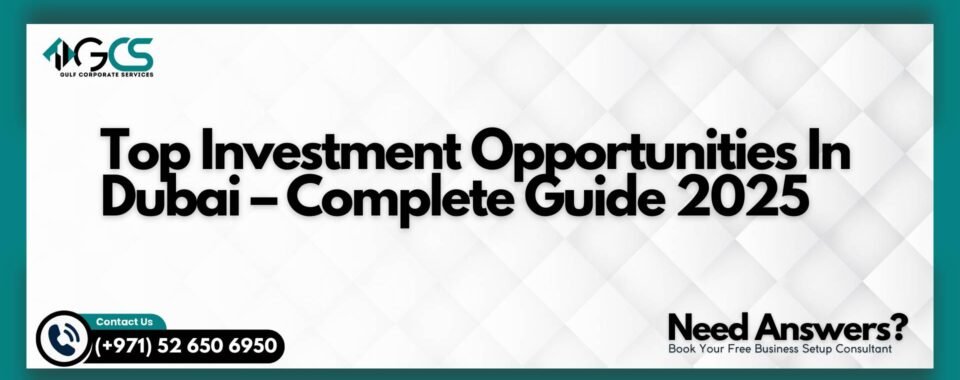
Dubai has transformed into one of the world’s most attractive investment destinations, offering unparalleled opportunities for both local and international investors. With its strategic location, business-friendly policies, and visionary leadership, Dubai continues to attract billions in foreign direct investment annually. The emirate’s commitment to diversifying its economy beyond oil has created numerous sectors ripe for investment, making it a premier choice for investors in Dubai.
The UAE investment landscape has evolved significantly, with Dubai leading the charge in innovation, sustainability, and economic growth. From traditional sectors like real estate investment Dubai to emerging opportunities in fintech, renewable energy, and artificial intelligence, the city offers diverse portfolio options for sophisticated investors seeking high returns and long-term growth potential.
Real Estate Investment Opportunities
Dubai real estate market remains one of the most lucrative investment sectors, consistently delivering strong returns for both residential and commercial investors. The emirate’s property investment landscape offers various opportunities, from luxury villas in premium communities to high-yield commercial properties in business districts.
Residential property in Dubai continues to attract international buyers seeking rental income and capital appreciation. Areas like Dubai Marina, Downtown Dubai, and Palm Jumeirah offer premium properties with strong rental yields ranging from 6-8% annually. These locations provide excellent lifestyle amenities and proximity to business centers, making them highly desirable for expatriate professionals.
Commercial real estate in Dubai presents opportunities in office spaces, retail outlets, and industrial properties. The Dubai International Financial Centre (DIFC) and Dubai Internet City command premium rents due to their strategic importance as business hubs. Warehouse investment in areas like Dubai South and Dubai Industrial City benefits from the emirate’s position as a global logistics hub.
Off-plan properties Dubai offer attractive payment plans and potential capital appreciation before completion. Many developers provide flexible payment schedules, allowing investors to secure properties with minimal upfront investment. Dubai Creek Harbour, Mohammad Bin Rashid City, and Dubai Hills Estate represent major upcoming developments with significant investment potential.
The Dubai Land Department has implemented investor-friendly regulations, including long-term visas for property investors and streamlined transaction processes. Foreign ownership is permitted in designated areas, making Dubai accessible to international investors seeking stable, high-yield investments.
Technology and Innovation Sector Investments
Dubai’s transformation into a smart city has created numerous opportunities in the technology investment sector. The government’s commitment to becoming a global technology hub by 2025 has resulted in significant investments in infrastructure and supportive policies for tech startups Dubai.
Artificial Intelligence (AI) investment opportunities abound as Dubai implements its AI Strategy 2071. The emirate aims to become the world’s smartest city, creating demand for AI solutions in government services, healthcare, transportation, and education. AI companies Dubai benefit from government contracts, tax incentives, and access to sandbox environments for testing innovative solutions.
Fintech Dubai represents one of the fastest-growing investment sectors, with the Dubai International Financial Centre serving as the regional hub for financial technology. Digital banking, cryptocurrency exchanges, robo-advisors, and insurtech companies find favorable regulatory environments and access to regional markets.
E-commerce investment continues growing as online shopping adoption increases across the GCC region. Dubai’s position as a logistics hub makes it ideal for e-commerce warehousing and last-mile delivery solutions. Companies focusing on cross-border e-commerce benefit from Dubai’s free trade zones and international connectivity.
Blockchain technology investment gains momentum as Dubai implements blockchain across government services. The Dubai Blockchain Strategy aims to make the emirate the first blockchain-powered government by 2025, creating opportunities for blockchain developers and cryptocurrency businesses.
Healthcare and Biotechnology Investments
The healthcare investment in Dubai sector offers tremendous growth potential as the emirate positions itself as a regional medical tourism hub. Dubai Health Authority initiatives to attract international patients create demand for specialized medical facilities and cutting-edge treatments.
Medical tourism in Dubai generates significant revenue, with patients from across the region seeking high-quality healthcare services. Private hospitals, specialty clinics, and medical centers offering cosmetic surgery, fertility treatments, and advanced diagnostics show strong investment returns.
Biotechnology investment opportunities emerge as Dubai develops its life sciences sector. The Dubai Science Park provides infrastructure and incentives for pharmaceutical companies and biotech startups. Research and development in areas like personalized medicine, genomics, and medical devices receive government support and funding.
Digital health solutions, including telemedicine platforms, health apps, and wearable technology, address growing demand for convenient healthcare access. The COVID-19 pandemic accelerated adoption of digital health solutions, creating sustainable investment opportunities.
Healthcare infrastructure investments in hospitals, clinics, and diagnostic centers benefit from Dubai’s growing population and medical tourism sector. Public-private partnerships in healthcare development offer stable, long-term returns for institutional investors.
Renewable Energy and Sustainability Investments
Dubai’s commitment to sustainable development creates significant opportunities in the renewable energy investment sector. The Dubai Clean Energy Strategy 2050 aims to generate 75% of the emirate’s energy from clean sources, driving massive investments in solar energy, wind power, and energy storage solutions.
Solar energy Dubai leads the region in solar power development, with projects like the Mohammed bin Rashid Al Maktoum Solar Park demonstrating the emirate’s commitment to renewable energy. Solar panel installation, energy storage systems, and smart grid technologies offer attractive investment opportunities.
Green building investment grows as Dubai implements stricter environmental standards for construction projects. LEED-certified buildings, sustainable architecture, and energy-efficient systems command premium rents and valuations in the market.
Electric vehicle (EV) infrastructure investment opportunities arise as Dubai promotes sustainable transportation. EV charging stations, battery technology, and electric vehicle sales benefit from government incentives and growing consumer acceptance.
Waste management investment addresses Dubai’s growing waste generation through innovative recycling and waste-to-energy solutions. Circular economy initiatives create opportunities for companies specializing in sustainable packaging, recycling technology, and waste reduction systems.
Tourism and Hospitality Investments
Tourism investment Dubai remains robust despite global challenges, with the emirate consistently ranking among the world’s top tourist destinations. Expo 2020 legacy projects and ongoing infrastructure development support long-term tourism growth.
Hotel investment Dubai offers various opportunities from luxury resorts to budget accommodations. Branded residences, serviced apartments, and short-term rental properties cater to different market segments and provide attractive yields for investors.
Entertainment investment benefits from Dubai’s position as the region’s entertainment capital. Theme parks, entertainment complexes, gaming facilities, and cultural attractions draw millions of visitors annually, creating stable revenue streams for investors.
Food and beverage investment thrives in Dubai’s diverse culinary landscape. Restaurant franchises, food delivery platforms, ghost kitchens, and specialty food retail benefit from the emirate’s multicultural population and tourism sector.
Travel technology investments, including booking platforms, tour operator software, and hospitality management systems, support the growing tourism infrastructure and digital transformation of the sector.
Education and Training Sector Investments
Education investment Dubai addresses growing demand for quality educational services from the emirate’s expanding population. Private schools, higher education institutions, and vocational training centers offer stable returns and social impact.
International school investment particularly attracts parents seeking world-class education for their children. Schools offering British curriculum, American curriculum, and International Baccalaureate programs command premium fees and have consistent demand.
EdTech investment grows as digital learning becomes mainstream. Online learning platforms, educational apps, virtual reality training, and artificial intelligence tutoring systems address diverse educational needs across age groups.
Professional training investments in areas like digital skills, healthcare training, and technical education benefit from government initiatives to develop local talent and reduce dependence on foreign expertise.
University partnerships and branch campuses of international institutions create opportunities for education infrastructure investment and student housing development.
Logistics and Transportation Investments
Dubai’s strategic location makes it a global logistics hub, creating numerous transportation investment opportunities. Dubai Logistics City, Al Maktoum International Airport, and Jebel Ali Port anchor the emirate’s logistics infrastructure.
Warehousing investment benefits from Dubai’s role in regional distribution and e-commerce growth. Cold storage facilities, automated warehouses, and last-mile delivery services show strong demand and attractive returns.
Maritime investment opportunities include shipping companies, port services, and marine logistics. Dubai’s position between East and West makes it crucial for international trade routes.
Aviation investment extends beyond airlines to include cargo services, aircraft maintenance, ground handling, and aviation technology. Al Maktoum International Airport expansion creates additional opportunities in aviation-related services.
Smart transportation investments in ride-sharing platforms, autonomous vehicles, traffic management systems, and mobility-as-a-service solutions align with Dubai’s smart city initiatives.
Financial Services and Fintech
The financial services in Dubai sector offers diverse investment opportunities as the emirate strengthens its position as a regional financial hub. DIFC and ADGM provide regulatory frameworks for Islamic finance, wealth management, and investment banking.
Digital banking and neobank investments address changing consumer preferences for digital financial services. Mobile payment platforms, peer-to-peer lending, and crowdfunding platforms serve underbanked populations and SMEs.
Insurance technology investments include insurtech startups, digital insurance platforms, and parametric insurance solutions. The growing economy and population drive demand for innovative insurance products.
Wealth management services targeting high-net-worth individuals and family offices benefit from Dubai’s status as a preferred residence for wealthy individuals from across the region.
RegTech solutions help financial institutions comply with evolving regulations while reducing costs and improving efficiency. KYC technology, anti-money laundering solutions, and regulatory reporting systems show strong market demand.
Retail and Consumer Goods
Retail investment in Dubai capitalizes on the emirate’s position as a shopping destination and its diverse consumer base. Shopping malls, outlets, and specialty retail concepts cater to both residents and tourists.
Luxury retail investment benefits from Dubai’s affluent population and high-spending tourists. Designer boutiques, jewelry stores, and premium brands perform well in prime locations like Dubai Mall and Mall of the Emirates.
F&B retail investments include restaurant chains, cafes, food courts, and specialty food stores. Dubai’s multicultural population creates demand for diverse culinary offerings and authentic international cuisines.
E-commerce retail growth creates opportunities in online marketplaces, direct-to-consumer brands, and omnichannel retail solutions. Social commerce and influencer marketing platforms gain traction among younger consumers.
Consumer technology investments in smart home products, personal electronics, and lifestyle apps address the tech-savvy population’s evolving needs and preferences.
Agriculture and Food Security
Agriculture investment in Dubai addresses food security concerns through innovative farming technologies and sustainable food production methods. Vertical farming, hydroponic systems, and controlled environment agriculture maximize production in limited space.
Food processing investments benefit from Dubai’s role as a regional food hub and growing demand for processed foods. Halal food processing, organic food production, and specialty food manufacturing serve diverse market segments.
Agritech investment includes precision agriculture, farm management software, irrigation technology, and crop monitoring systems. These technologies improve efficiency and sustainability in food production.
Food delivery and meal kit services address changing consumer lifestyles and preferences for convenient food options. Ghost kitchens and virtual restaurants reduce overhead costs while serving growing delivery demand.
Aquaculture investment in fish farming and sustainable seafood production addresses protein needs while reducing dependence on imports and supporting environmental sustainability goals.
Conclusion
Dubai’s diverse economy offers exceptional investment opportunities across multiple sectors, from traditional real estate and hospitality to emerging fields like artificial intelligence and renewable energy. The emirate’s strategic location, business-friendly policies, and visionary leadership create an ideal environment for both short-term gains and long-term wealth building.
The key to successful investing in Dubai lies in understanding market dynamics, regulatory requirements, and growth trends across different sectors. Foreign investors benefit from favorable policies, tax advantages, and access to regional markets, making Dubai an attractive destination for international investment.
As Dubai continues its transformation into a global hub for innovation, sustainability, and economic growth, early investors in emerging sectors stand to benefit significantly from the emirate’s ambitious development plans. The combination of government support, infrastructure development, and market demand creates a compelling investment landscape for sophisticated investors.
Business Setup Consultants in Dubai, UAE provide essential guidance for investors seeking to establish successful ventures in the emirate. Their expertise in regulatory compliance, market analysis, and business strategy ensures that investment decisions are well-informed and aligned with Dubai’s growth trajectory, maximizing the potential for sustainable returns and long-term success.
Frequently Asked Questions (FAQs)
What are the minimum investment requirements for foreign investors in Dubai?
Minimum investment varies by sector and visa type. Real estate investments start from AED 1 million for investor visas, while business investments can range from AED 100,000 to several million depending on the free zone and business activity.
Which sectors offer the highest returns on investment in Dubai?
Technology, real estate, healthcare, and renewable energy sectors currently offer attractive returns. Real estate yields range from 6-8%, while tech startups and healthcare investments can provide higher returns but with increased risk.
Are there tax advantages for investors in Dubai?
Yes, Dubai offers 0% personal income tax, no capital gains tax on most investments, and competitive corporate tax rates. Free zones provide additional tax incentives including 0% corporate tax for qualifying activities.
How can foreign investors access Dubai’s investment opportunities?
Foreign investors can invest through various structures including free zone companies, mainland businesses with local partners, or direct property purchases in designated areas. Professional consultation is recommended for optimal structure selection.
What are the risks associated with investing in Dubai?
Main risks include market volatility, regulatory changes, currency fluctuations, and sector-specific risks. However, Dubai’s stable political environment and diversified economy help mitigate many investment risks.
How long does it take to establish a business for investment purposes in Dubai?
Business setup typically takes 2-4 weeks in free zones and 4-8 weeks for mainland companies, depending on the complexity and required approvals. Some sectors may require additional licensing time.
What financing options are available for investors in Dubai?
UAE banks offer competitive financing for real estate (up to 75% for residents, 50% for non-residents) and business investments. Islamic financing options are also widely available alongside conventional lending.
Is it necessary to reside in Dubai to maintain investments?
No, physical residence is not required for most investments. However, certain visa categories and business activities may have residency requirements or benefits for active management.
How does Dubai’s regulatory environment support foreign investment?
Dubai maintains investor-friendly regulations with transparent processes, strong legal protections for foreign investors, and specialized courts for commercial disputes. Regular regulatory updates support business growth and innovation.
What professional services should investors consider when investing in Dubai?
Key services include business setup consultants, legal advisors, tax consultants, real estate agents, and banking relationship managers. Professional guidance ensures compliance and optimal investment structuring for maximum returns.








